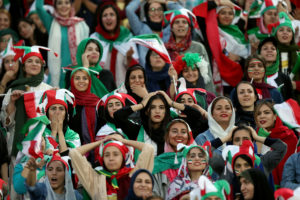Poor Harry Kane, roundly mocked for almost-but-not-quite wearing his One Love rainbow armband in support of lesbian, gay and trans people during England’s first game in Qatar on Monday. Attacked on the one hand by various curmudgeons for “self-serving virtue signalling” and ”hollow pieties”, he was then criticised by those well-known bleeding heart-types Roy Keane and Ray Winstone for capitulating in the face of a threatened booking from Fifa.
Generally, the public mood on armbands and bent knees seems to be split. There are those who assume every organised public gesture in the name of human rights must be altruistically intentioned and beneficial. And then there are those who dismiss all such gestures as self-interested attempts to gain social capital. The relation between the two looks symbiotic: the more enthusiastically the first group don flags, lanyards, and armbands, the more obstinately the second group insists there is nothing but self-promotion at the end of this particular rainbow.
Prospects of a more nuanced take aren’t helped by Left-wing lip service to universal human rights, combined in practice with squeamishness about saying anything robust in their favour which might exacerbate racial or non-Christian religious sensitivities. One only has to compare the relatively muted and qualified response of Stonewall to the stabbing-to-death of three gay men in Reading in 2021 (perpetrator: a militant Libyan asylum seeker with a history of violence) to last week’s impassioned response to a US shooting in a gay nightclub (perpetrator: a white American with a history of threatening to blow up his mum’s house — although, in an inconvenient plot twist, he has since come out as non-binary).
Apart from leaving the stage clear for Right-wing commentators to claim the divisive spoils, the Left’s squeamishness about cultural insensitivity also entails that activist gestures are most plentiful in the contexts where they are least needed. The safest space for full-throated political activism is apparently one where you can rely on the audience’s proximity to your own values, not to mention their repressed politeness and fear of being judged as the bad people. Many tolerant people in the UK are by now very fed up with all the needless hectoring and guilt-tripping.
This hectoring reaches its apotheosis during the annual farce of Transgender Day of Remembrance in the UK. Nagged into it by Stonewall and other transactivist organisations, last week various institutions fell over themselves to mark the murders of precisely zero UK trans people during the previous year with various fulsome tributes. Perhaps imaginatively accompanied by visions of the Last Post bleakly ringing out over the Somme, the Welsh Parliament even dramatically tweeted out: “Today, we remember the trans individuals who have lived, loved, fought and fallen.”
Yet for UK political institutions to address a major factor in the majority of trans murders worldwide — working in the sex trade — not only would they have to address male violence and sex-buying, they would also have to take a public stand in some extremely macho and homophobic cultures overseas. Much easier, then, to put all such deaths down to amorphous “transphobia” and then return to the main task of leveraging irrational guilt out of soft-touch Lefties for the purposes of cash extraction and power consolidation.
But those on the Right should not think themselves off the hook either. On the side of those fulminating on Twitter about Kane’s supposed virtue-signalling were various socially conservative and post-liberal types, disapproving of the arrogance involved in imposing Western values on the Qatari nation. This position was, perhaps inadvertently, well-summed up by French captain Hugo Lloris. “When we are in France, when we welcome foreigners, we often want them to follow our rules, to respect our culture, and I will do the same when I go to Qatar, quite simply,” he said last week. “I can agree or disagree with their ideas, but I have to show respect.”
It’s likely Lloris said this for the sake of an easy life. But a growing number these days seem relatively uncritical — even occasionally offering qualified approval — of authoritarian regimes, partly because they are distinctly disillusioned with Western liberalism. Specifically, they are tired with the way that the internal logic of liberalism apparently results in endless quests for new forms of “freedom” — religious, sexual, bodily, and so on — with the result that traditional social structures such as marriage, the family, and local community have been undermined. Whereas many liberals on both the Left and Right would present things such as the advent of the Pill, no-fault divorce, commercial surrogacy, and rampant bodily modification as having no downsides whatsoever, post-liberals tend to be much more focused on what has been lost in terms of social cohesion and stability, and also upon the apparent moral and spiritual emptiness of what replaces it.
I’m not saying that these critics of liberalism would admire a country partly run under Sharia law. I’m suggesting, rather, that keen awareness of the limits of the dominant Western political model tends to make one less likely to criticise more authoritarian alternatives. And yet, no one should kid himself that failing to object vociferously to the imprisonment of gay men, or to the forcing of women to be dependent on male guardians for all their major life decisions, is a simple mark of respect for a less fractured and narcissistic culture than our own. Unless an unabashed cultural relativist, even the most post of the post-libs should acknowledge that personal autonomy — in the basic sense of being able to choose what you do — is a universally important moral and political value, whatever else is also valuable.
This seems to be well-recognised with respect to the past, with leading post-liberal writers such as Patrick Deneen rightly decrying slavery. Qatari women and sexual minorities, living in the here and now, deserve no less a defence. Radical feminists have long complained of the tendency of liberal feminists to go suspiciously quiet when it comes to the authoritarian repression of women in non-Western cultures or minority communities. Post-liberals must not make the same mistake. And nor should they tell themselves that Qatari women don’t know what they are missing. It might be true that women in medieval England couldn’t miss what they didn’t know they didn’t have — but unlike them, Qatari women have at least some access to the internet.
Another source of reluctance to intervene here might be a general scepticism about the notion of human rights. Certainly, there’s no need to be credulous about every audaciously solipsistic claim made in the name of the “rights” of an identity group. It’s also reasonable, in my view, to have a relatively pared down account of what human rights actually are: not quasi-religious edicts coming down to us from some mysterious ethical realm on high, but rather requirements derived from basic and universal human needs, articulated in terms of the minimum standard required for well-being and not the maximum. We can argue about whether free movement across the globe is a human right in this sense, but it would be difficult to argue that free movement around your own village is not.
So, though it’s a shame that Kane eventually bottled it, I think it’s great that he initially wanted to take a public stand in Qatar. Despite what Piers Morgan thinks, whether a gesture like armband-wearing counts as “virtue-signalling” surely depends on the context. Within relatively progressive enclaves in the UK, public gestures in favour of values most people already hold there are superfluous — and the primary motive for them does indeed start to look like a desire to show off your moral superiority rather than to tackle the political non-issue in question.
But in profoundly illiberal Qatar, things are very different. I see no reason not to take any armband-wearing over there as a sincere and admirable attempt to speak up for the rights of oppressed others, and it seems to me highly uncharitable to take it any other way. Hell, never mind Qatar — in UK football, things are also very different. As is well-known, there are almost certainly gay players in the Premier League but none who will dare come out publicly, so great is the stigma. In either of these contexts, then — despite the critics — a rainbow armband or two is surely a wonderful thing.
Disclaimer
Some of the posts we share are controversial and we do not necessarily agree with them in the whole extend. Sometimes we agree with the content or part of it but we do not agree with the narration or language. Nevertheless we find them somehow interesting, valuable and/or informative or we share them, because we strongly believe in freedom of speech, free press and journalism. We strongly encourage you to have a critical approach to all the content, do your own research and analysis to build your own opinion.
We would be glad to have your feedback.
Source: UnHerd Read the original article here: https://unherd.com/



